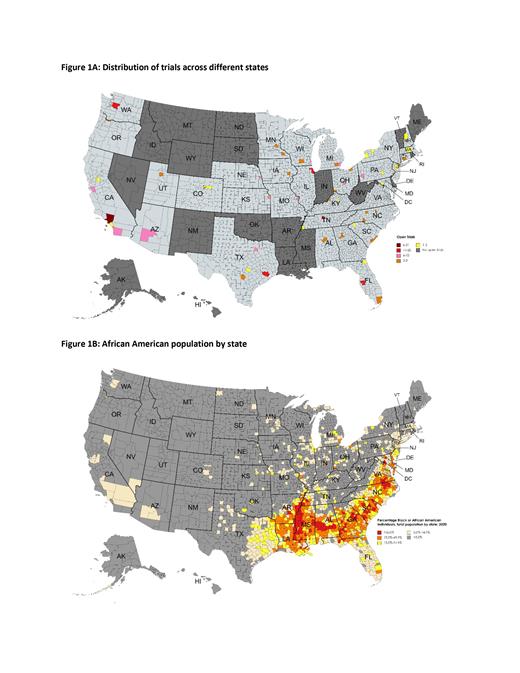Introduction:
The number of clinical trials of chimeric antigen receptor T- cell (CAR-T) therapy and bispecific antibodies to treat diffuse large B-cell lymphoma (DLBCL) has increased exponentially. However, there is geographic limitation to offering these trial and universal access appears to be limited especially for minorities and those in low socioeconomic stratum. Here, we investigate the geographical and racial disparities in accessing CAR-T cell therapy and bispecific antibodies trials for DLBCL.
Methods:
Data on clinical trials were obtained from ClinicalTrials.gov, the largest clinical trials registry database that provides data on clinical trials that are completed or in process. We searched ClinicalTrials.gov in May 2023 using the terms diffuse large B-cell lymphoma, DLBCL, CAR-T, chimeric antigen receptor T cells, chimeric, bispecific antibodies, bispecific, BCMA, and T-cell engager. All available trials listed as completed, recruiting, active-nonrecruiting, terminated, or suspended. The collected data abstracted from ClinicalTrials.gov included study titles, National Clinical Trial identification numbers, trial phase and intervention, actual or expected number of participants (in studies that did not complete enrollment), primary outcomes, recruiting sites, funders, and specific inclusion and exclusion criteria. 2020 United States (US) Census Bureau data was used to obtain data on race and ethnicity. Analysis for this study was performed using SPSS version 26.
Results:
A total of 76 out of 133 clinical trials with one or more open site in the US were included for this systematic review. There were 63 (82.9%) CAR-T therapy and 13 (17.1%) bispecific antibodies trials. A total of 166823 participants were either enrolled or expected to enroll in these clinical trials including 165938 (99.5%) of CAR-T and 885 (0.5%) bispecific antibodies clinical trials participants. Sixty-five (85.5%) clinical trials were only open in the US while 11 (14.5%) clinical trials were open in the US and other countries. The majority of the trials 49 (64.5%) were funded by the industry, while 27 (35.5%) were non-industry sponsored. The primary outcomes of the studies were safety related, efficacy related, and both safety and efficacy related in 43 (56.6%), 22 (28.9%), and 11 (14.5%) trials, respectively.
One hundred and twenty-six unique study sites for the 76 analyzed clinical trials were identified. The mean number of sites per trial were 4.5 (1-26) for CAR-T trials and 4.4 (1-24) for bispecific antibodies. The study sites were distributed in 31 different states and mean number of trial per state were 11 (0-51). Most sites for trials were in Southern states 39 (31%), followed by Midwestern 32 (25.4%), Northeastern 30 (23.8%), and Western states 25 (19.8%). The highest number of study locations were in California (13), New York (9), and Pennsylvania (9) while the highest number of open studies were in California (51), Texas (32), and New York (23). Twenty states had no open CAR-T or bispecific antibodies clinical trials including three in the Northeast (Maine, Rhode Island, and Vermont), three in the Midwest (Indiana, North and South Dakota), seven in the South (Delaware, District of Columbia, West Virginia, Mississippi, Arkansas, Louisiana, and Oklahoma), and seven in the West (Idaho, New Mexico, Montana, Nevada, Wyoming, Alaska, and Hawaii). (Figure 1A)
Using Census Bureau data, only 33.3% of the African American (AA) (13 669 915 of 41 104 200) lived in a county with a CAR-T or bispecific antibodies trial. There were only six states (12%) with 50% or more of the AA population living in a county with an open CAR-T or bispecific antibody trial and 15 states (29%) with 30% or more of their AA county residents. Seven out of ten states with the highest proportion of AA residents (18.6%-41.4%) have no (four states) or less than four clinical trial sites (three states) for either CAR-T or bispecific antibodies. (Figure 1B)
Conclusion:
There is significant geographic and racial disparity in accessing CAR-T cell therapy and bispecific antibodies trials for DLBCL. Strategies should be framed to address the causes for the observed disparities and to improve access.
Disclosures
Jaglal:Agios: Membership on an entity's Board of Directors or advisory committees; Janssen: Membership on an entity's Board of Directors or advisory committees; SOBI: Membership on an entity's Board of Directors or advisory committees.


This feature is available to Subscribers Only
Sign In or Create an Account Close Modal